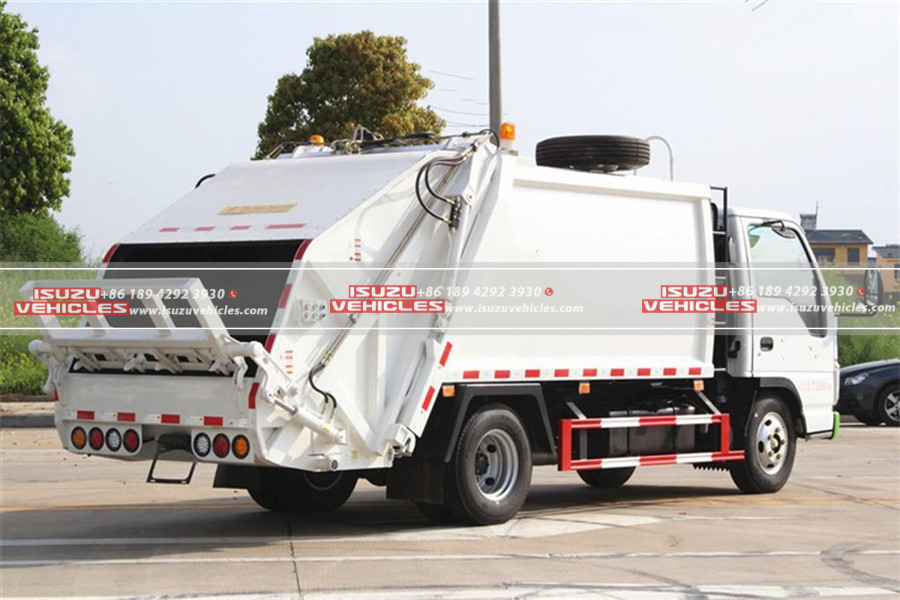Introduction: ISUZU’s Commitment to Sustainable Waste Management Solutions
In a strategic move to improve urban sanitation and waste management services, ISUZU Vehicle has successfully delivered 12 ISUZU garbage trucks to Saudi Arabia. This significant delivery is part of the country’s ongoing efforts to modernize its waste collection infrastructure, aligning with global environmental standards. These new ISUZU garbage trucks will support Saudi Arabia’s cities in handling waste more efficiently and sustainably, ensuring cleaner and healthier living conditions for its residents.
ISUZU’s Advanced Garbage Truck Fleet: Supporting Saudi Arabia’s Growing Urban Areas
Saudi Arabia’s expanding urban areas face increasingly complex waste management challenges due to rapid population growth and industrial development. The introduction of 12 ISUZU garbage trucks into the country’s waste collection fleet marks a milestone in addressing these challenges. Known for their robust performance, reliability, and long-term durability, ISUZU garbage trucks are the ideal choice for demanding waste management environments.
The delivery includes various models of ISUZU garbage trucks, each designed to meet specific needs, including heavy-duty waste collection in densely populated areas and residential regions. These trucks are equipped with cutting-edge waste handling systems, offering increased capacity, fuel efficiency, and lower emissions compared to older models. With these new additions, Saudi Arabia’s waste management service providers can expect a significant reduction in operational downtime and a more streamlined collection process.
Key Features of the Delivered ISUZU Garbage Trucks
The 12 ISUZU garbage trucks delivered to Saudi Arabia come with several advanced features designed to improve the overall efficiency of waste collection operations. Among the prominent features are:
- Enhanced Fuel Efficiency: ISUZU’s commitment to reducing the carbon footprint is evident in the fuel-efficient engine systems of these trucks, allowing for reduced emissions and long-distance collection capabilities.
- High-Capacity Loaders: These trucks are equipped with powerful hydraulic lifting systems that allow for easier and quicker loading of waste, improving operational speed while maintaining safety and reliability.
- Ergonomic Driver Comfort: ISUZU understands the importance of driver comfort, especially for long shifts. These trucks come with user-friendly cabins that offer superior comfort and advanced technology for better operational management.
- Durability and Reliability: ISUZU garbage trucks are built to withstand tough working conditions, offering enhanced durability even in the harshest environments.
The Role of ISUZU’s Sweeper Trucks and Vacuum Trucks in Saudi Arabia’s Waste Management Strategy
In addition to the delivery of garbage trucks, ISUZU’s sweeper trucks and vacuum trucks are also crucial components of Saudi Arabia’s waste management strategy. The introduction of ISUZU sweeper trucks enhances the ability to clean city streets and public spaces efficiently, ensuring a higher standard of urban cleanliness. These trucks are designed to handle various types of debris, including dust, dirt, and leaves, improving air quality and creating safer, more attractive public areas.
Meanwhile, ISUZU vacuum trucks play an essential role in the country’s industrial waste management efforts, specifically for liquid waste and sewage removal. By deploying these highly specialized trucks, Saudi Arabia can manage waste in a more hygienic and efficient manner, reducing the environmental impact of waste disposal.
With a combination of ISUZU garbage trucks, vacuum trucks, and sweeper trucks, Saudi Arabia is now well-equipped to address both residential and industrial waste challenges across its cities.
A Step Forward in Saudi Arabia’s Waste Management Infrastructure
The introduction of ISUZU garbage trucks is a crucial step toward modernizing the waste management infrastructure in Saudi Arabia. As part of the Vision 2030 initiative, which aims to improve the quality of life and ensure a more sustainable future, this fleet of ISUZU garbage trucks will contribute to the country’s long-term environmental goals.
Moreover, the trucks are designed with advanced waste handling systems, ensuring that the waste collection process becomes more efficient and environmentally friendly. These trucks’ durability and high-performance features will reduce maintenance costs and downtime, allowing waste management companies to focus on delivering exceptional services to urban communities.
Future Plans for Sustainable Waste Management in Saudi Arabia
Looking ahead, Saudi Arabia plans to further enhance its waste management capabilities by continuing to invest in modern, sustainable technology. The introduction of ISUZU garbage trucks is only the beginning of a larger initiative to deploy advanced equipment to tackle waste management challenges across the Kingdom. With the focus on reducing landfill waste, improving recycling programs, and decreasing overall environmental impact, Saudi Arabia is positioning itself as a leader in sustainable waste management.
As more trucks are deployed and the fleet continues to expand, it is expected that ISUZU garbage trucks, vacuum trucks, and sweeper trucks will play an even more integral role in keeping the Kingdom’s cities clean and safe. The partnership between ISUZU will continue to drive forward innovation in the waste management industry, ensuring that cities across Saudi Arabia can meet their environmental goals and maintain a high quality of life for their residents.
This delivery of 12 ISUZU garbage trucks to Saudi Arabia is just the beginning of what promises to be a long and fruitful relationship between the two parties, bringing cutting-edge waste management solutions to one of the most rapidly developing regions in the world.
